The AI-enabled eCommerce market size is estimated to reach $16.8 billion by 2030. Additionally, customer-service analytics is AI’s most common use case in marketing and sales. 57% of all respondents in emerging economies claim to have adopted AI.
In recent times, the transformative influence of Artificial Intelligence (AI) and Machine Learning (ML) in e-commerce has become undeniable. AI/ML systems let marketers analyze large amounts of data, make accurate predictions, and automate processes. As a result, AI/ML has found many applications in eCommerce marketing, from personalizing customer experiences to optimizing supply chains.
.
Today, we are witnessing a rapid integration of AI/ML as technologies continue to evolve and customers become more familiar. With access to the tools and their ease of use, the adoption of AI and ML-driven applications is now inevitable.
Types of Commonly-Used Technologies
We are used to hearing of and thinking of AI as a single, seamless piece of technology. It is a common name used to refer to various models. However, that’s hardly the case. Coming to eCommerce specifically, the following are four leading AI/ML technologies that are most often used:
- Natural language processing (NLP): This type of AI allows computers to understand, support, and manipulate spoken or written words the way a human can.
- Machine learning (ML): Machine learning is an umbrella term for problem-solving by computers that imitate the way humans learn to “discover” their own algorithms.
- Computer vision (CV): Computer vision is a field of artificial intelligence that helps computers acquire, process, analyze, and understand digital images or videos.
- Data mining: Data mining extracts and detects patterns in large data sets to inform AI algorithms and systems
- Deep Reinforcement learning:It’s a subfield of ML that combines reinforcement learning (RL) and deep learning. RL considers the problem of a computational agent learning to make decisions by trial and error.
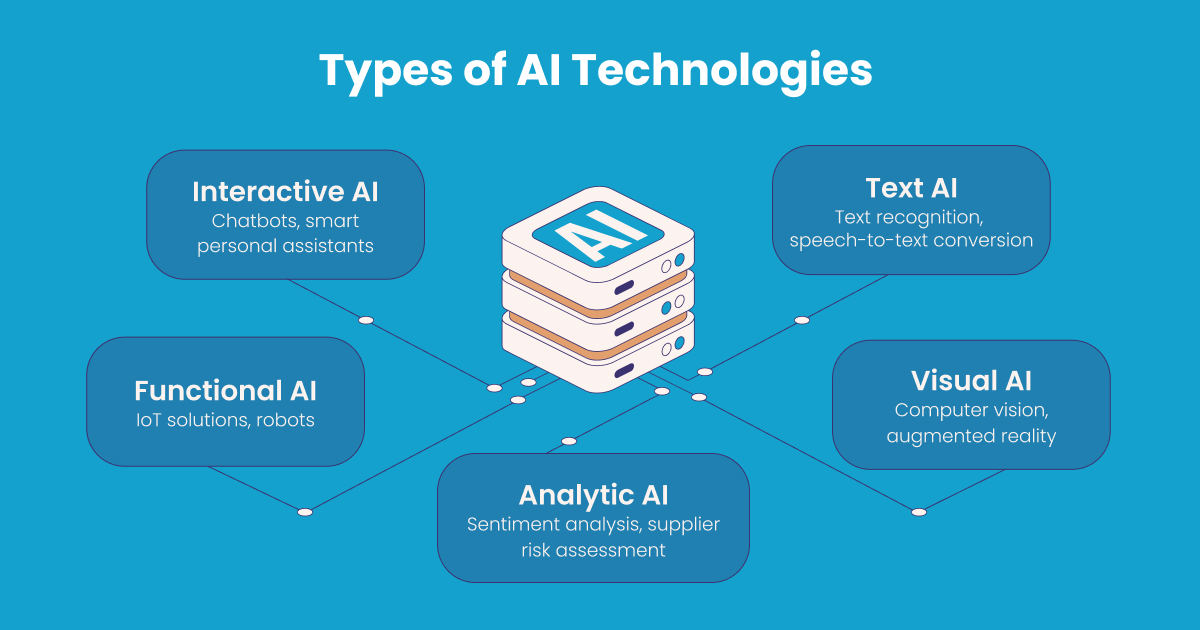
The Top 10 Ways AI Transforms eCommerce
Using AI/ML in eCommerce marketing offers a wide range of competitive advantages that can skyrocket the success and productivity of online retail businesses.
As technology advances, these advantages will become even more evident, making AI/ML an essential tool for eCommerce businesses seeking to thrive in a competitive market.
Here are the top ten ways of leveraging AI/ML to elevate your eCommerce business.
#1. Personalized Product Recommendations
The use of AI/ML in eCommerce that most of us have directly experienced is personalized product recommendations. According to a Forbes Insights report, personalization directly impacts sales maximization, basket size (the total number of products a consumer purchases in one transaction), and profits in D2C distribution channels.
AI/ML algorithms can be employed to analyze a user’s browsing and purchase history, demographic data, and real-time behavior to suggest products that are most relevant to them. This individualized approach improves the shopping experience and significantly boosts conversion rates and sales.
Flipkart, for example, uses AI/ML to boost many aspects of its business, one of them being the use of algorithms that offer personalized product recommendations to users. This enhances user engagement and boosts sales.
Similarly, BigBasket employs AI/ML to create personalized shopping lists for users, i.e., Smart Basket, which provides suggestions based on previous purchases and preferences with regard to price points and quality.
Powerlook employed WebEngage’s Recommendation and Catalog Engine to solve for a lack of user-specific recommendations on their website. Based on a user’s purchase history, outfits and other clothing preferences, relevant options were recommended to users after 15 days from their last purchase. Products and choices were also recommended based on users’ cart history. The results, a 302% uptick in unique conversions, speak for themselves.

Just as it was able to help Powerlook, the WebEngage Recommendation and Catalog Engine can make a difference to your business by enabling you to generate personalized recommendations for your clientele.
#2. Predictive Analytics for Inventory Management
AI/ML-powered predictive analytics guide eCommerce businesses in optimizing their inventory management. It can analyze historical sales data, seasonality, market trends, and external factors like weather. These analyses allow the algorithms to forecast demand with remarkable accuracy. This helps retailers to reduce overstocking and understocking issues, resulting in cost savings and improved customer satisfaction.
The fashion eCommerce industry, which must keep up with trends to thrive, can greatly benefit from predictive analytics. AI/ML systems can help provide valuable intelligence for fashion brands by identifying patterns and providing deeper insights into fashion trends, purchase behavior, and inventory-oriented guidance.
A great example of this is Myntra. Using AI/ML to analyze data from fashion portals, social media, and Myntra’s customer database, they could figure out what products move fastest and ensure those were available on their app. As a result, Myntra brought out collections much faster than its competitors.

#3. Chatbots and Virtual Assistants
AI/ML-driven chatbots and virtual assistants are increasingly becoming integral to customer support in eCommerce. They answer frequently asked questions, offer product recommendations, and even process orders. These AI-powered systems operate 24/7, enhancing customer service, reducing response times, and increasing customer engagement.
For instance, Flipkart’s Decision Assistant chatbot uses various techniques to understand the “human thinking” behind a customer’s query and responds accordingly. The chatbot has contributed to Flipkart’s business metrics by reducing the number of conversations passed on to a human agent and lowering the cart abandonment rate.
Similarly, Nykaa’s virtual assistant, which has been listed as one of India’s best AI chatbots, helps customers with their purchases by offering personalized recommendations based on preferences expressed by the customer. It offers them the option of video chatting with an expert and is also capable of helping the customer find the relevant product on its own.
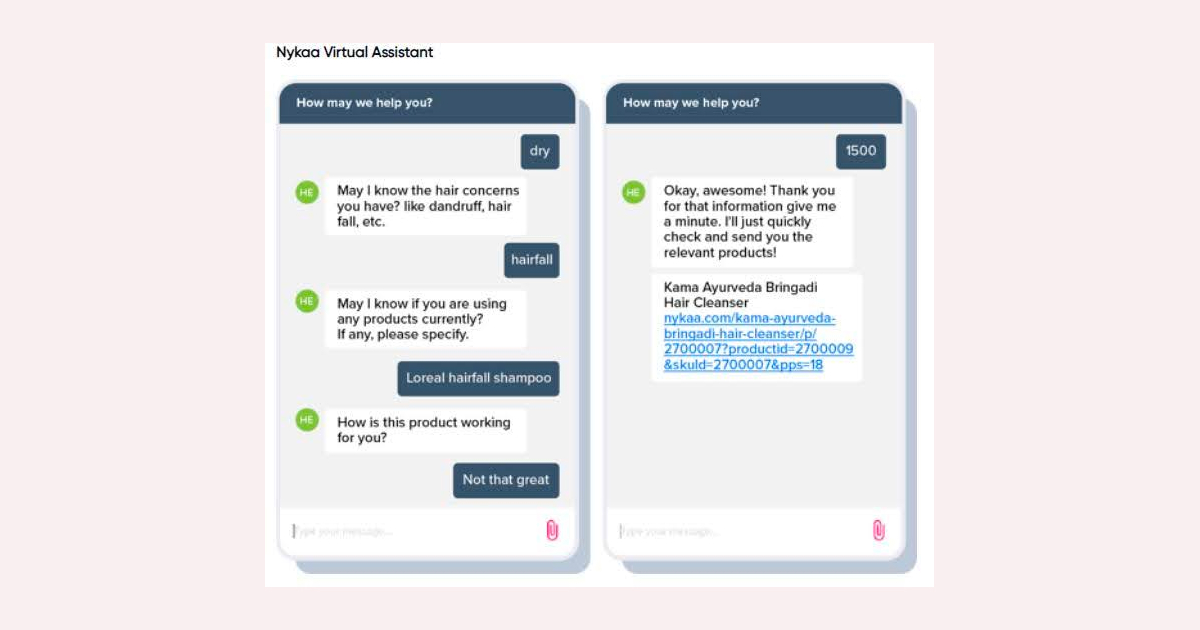
More recently, Myntra’s new generative AI chatbot, MyFashionGPT, enables users to search, in natural language, answers to queries such as, “I am going to Goa for a vacation. Show me what I can wear.”
#4. Dynamic Pricing
Dynamic pricing, also known as surge pricing, demand pricing, or time-based pricing, is a strategy where brands adjust prices flexibly for their products/services based on current market conditions. Leveraging a catalog allows efficient price updates considering factors like demand, and competition, and customer behavior. For example, if certain products are highly sought after, or market conditions change, the catalog adapts prices on the fly. This ensures businesses stay competitive, maximize revenue, and provide a smooth shopping experience by aligning prices with current market dynamics and customer preferences.
MakeMyTrip, a travel ecommerce brand uses AI/ML to adjust prices in real-time. This allows customers to receive contextual and relevant pricing information and contributes to customer engagement. This, in turn, leads to greater retention, less churn, and more conversions.
#5. Customer Segmentation and Targeting
AI/ML systems allow eCommerce marketers to segment their customer base more effectively. AI/ML-powered solutions to segmentation eliminate human bias, identify hidden patterns, and increase personalization, and they are greatly scalable. By analyzing customer data, it can identify distinct customer segments according to behavior, interests, and demographics.
You can leverage predictive segmentation to identify an ideal customer audience from the crowd. This AI/ML feature allows you to create segments based on the user’s propensity for a desired action.
Predictive segments use machine learning to predict which users are likely to take certain actions, like making a purchase or leaving. This method is more powerful than the usual way of categorizing users because it goes beyond existing data and attributes, allowing marketers to make more accurate predictions about user behavior as the world becomes more cookieless.
This lets businesses design targeted marketing campaigns. This sort of lead nurturing is more likely to lead to conversions than generic segmentation based on age or geographic location.
For MyGlamm, customer segmentation on the basis of the user personas (for example, a segment of all registered users who had 150 GlammPOINTS in their account and did not make any purchase) using WebEnage’s segmentation tools allowed them to design multiple journeys for these segments. Targeting their marketing efforts and communications to the users, depending on which stage in their journey they were, allowed them to hook customers effectively.
This resulted in improved user experiences, web and app engagement, with a 13.5% uplift in conversions by users who received a personalized email about an item in their cart, and a 166% growth in purchases by users who had previously abandoned their cart.

WebEngage’s expertise with customer segmentation helped MyGlamm achieve these phenomenal results. WebEngage can help you, too, to gain deeper insights about your business using customer segmentation.
#6. Visual Search and Image Recognition
AI-powered visual search and image recognition applications let people find products by looking at pictures rather than text. This technology can identify and match products based on pictures. This simplifies the shopping process as it allows users to search for products that they may not know the exact name of.
Lenskart, for example, bridges the gap in shopping for eyeglasses by allowing users to try on frames virtually to see which one suits them best. This removes the need for the customer to go to a store physically. Their virtual, augmented reality uses AI to detect a customer’s facial features and produces a personalized list of glasses for the customer in under 10 seconds. It allows them to try on the styles virtually and even share them with their friends for a second opinion.

Similarly, Pepperfry allows users to search for furniture and home decor items and provide virtual product demonstrations. It allows users to preview the furniture in their homes virtually so they can make informed decisions about purchases.
#7. Fraud Detection and Prevention
eCommerce businesses are vulnerable to various forms of fraud, such as payment fraud and account takeovers. AI algorithms can analyze transaction patterns and detect anomalies that are red flags for fraudulent activities. By automatically tagging such suspicious transactions, AI helps reduce losses and protect both businesses and customers. Such use of AI also builds trust between brands and customers, leading to better experiences and greater customer engagement.
An example of a company that uses AI for fraud detection and prevention is Flipkart. If, for instance, a seller decides to con the platform or use manipulated pictures in the listings, the AI algorithms can detect and flag the same. This ensures that customers get an accurate picture of what they are looking for.
#8. Email Marketing Optimization
AI/ML-driven email marketing automation tools are a game changers for email campaigns. These tools analyze customer behavior and preferences and personalize email content and delivery times. AI/ML-driven predictive analytics can also suggest products customers may be interested in, increasing the effectiveness of email marketing efforts.
WebEngage’s Generative AI feature allows you to create tailored email messages in no time! Generative AI helps you create personalized message templates, taking into account your audience’s preferences, demographics, and behavioral data. This ensures that your emails resonate with each recipient, driving higher engagement and conversions.
WebEngage was able to help Saudi Arabia’s leading eCommerce brand, HNAK, achieve a 67% open rate for cart abandonment emails. Using features like the drag-and-drop email builder helped HNAK to create aesthetic emails that were mobile-optimized. They were also able to reduce the manual effort that went into personalizing emails.
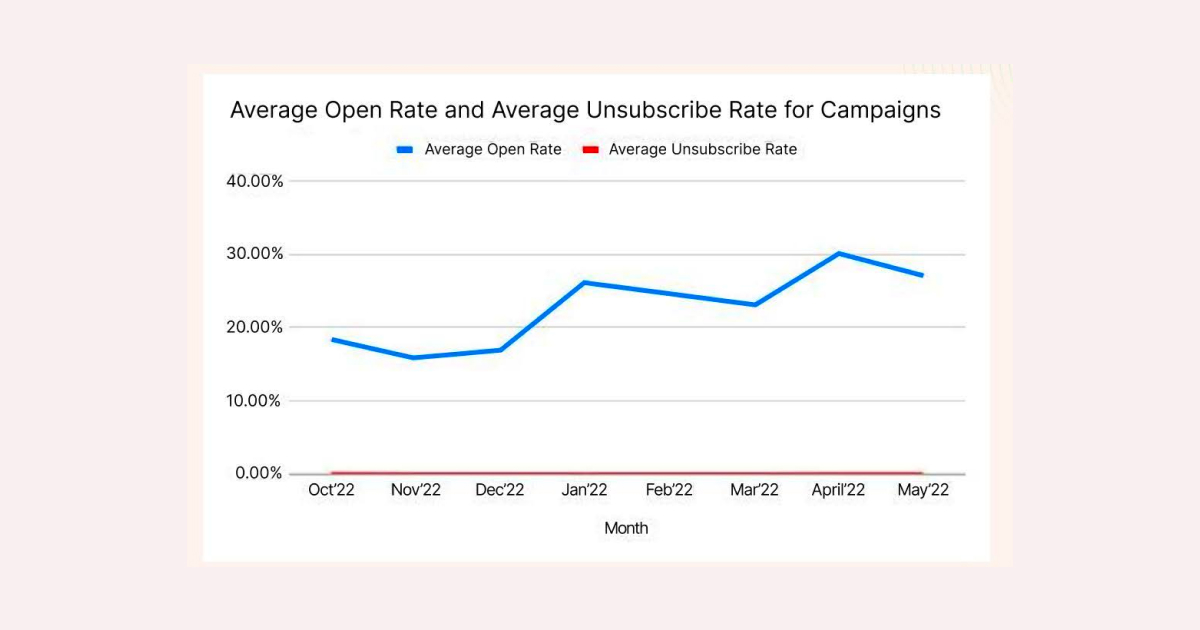
Another great example of how AI/ML can be leveraged to optimize email marketing comes from the impact story of Juicy Chemistry, a D2C organic skincare brand. Partnering with WebEngage allowed Juicy Chemistry to experiment with channels, segments, timings, and messaging. This led to better engagement and higher inboxing in non-promotional folders. Overall, Juicy Chemistry was able to achieve 4.5X growth in email conversions and 2X improvement in email open rates.
#9. Voice Search and Voice Commerce
Following the popularity of voice-activated devices like Amazon Echo and Google Dot Echo, AI is also enabling voice commerce. With voice commands, buyers can find products, place orders, or check their order status.
A unique way in which Flipkart leveraged voice commerce is by introducing the “Hagglebot,” a chatbot that allowed customers to haggle for a better deal during its Big Billion Days Sale promotion. The campaign was a huge success as Flipkart’s total sales revenue through products offered on Hagglebot reached $1.23 million. The average engagement time of the experience was 6 min 5 seconds, making it Google Assistant’s most engaging experience at the time.

MakeMyTrip, too, aims to make travel planning more inclusive and accessible by enabling voice-assisted booking in Indian languages.
#10. Supply Chain Management and Logistics
AI/ML is radically improving the efficiency of supply chain management and logistics for eCommerce companies. AI can assist with route planning, inventory management, and demand forecasting. This results in faster deliveries, lower operational costs, better inventory management, and improved customer satisfaction.
Flipkart’s AI-powered bots, called AGVs (Automated Guided Vehicles), for example, enable human operators to process 4,500 shipments an hour at twice the speed and with 99.9% accuracy. The bots have also enabled increases in warehouse capacity and throughput.
Conclusion
As we have seen in all the examples above, AI has revolutionized the eCommerce terrain by providing innovative, customer-focused solutions. They enable businesses to streamline operations and ultimately boost ROI. From personalized product recommendations to supply chain optimization, the top ten AI/ML applications discussed in this article have become requisite tools for eCommerce businesses looking to stay ahead of the competition.
WebEngage is at the forefront of this revolutionary technology and has harnessed the power of its marketing automation suite to help eCommerce businesses like yours achieve phenomenal results. Request a Demo today to find out how WebEngage can help you leverage the game-changing thrust of AI in eCommerce marketing.






























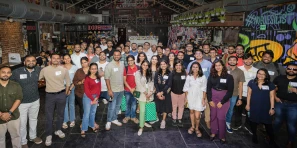



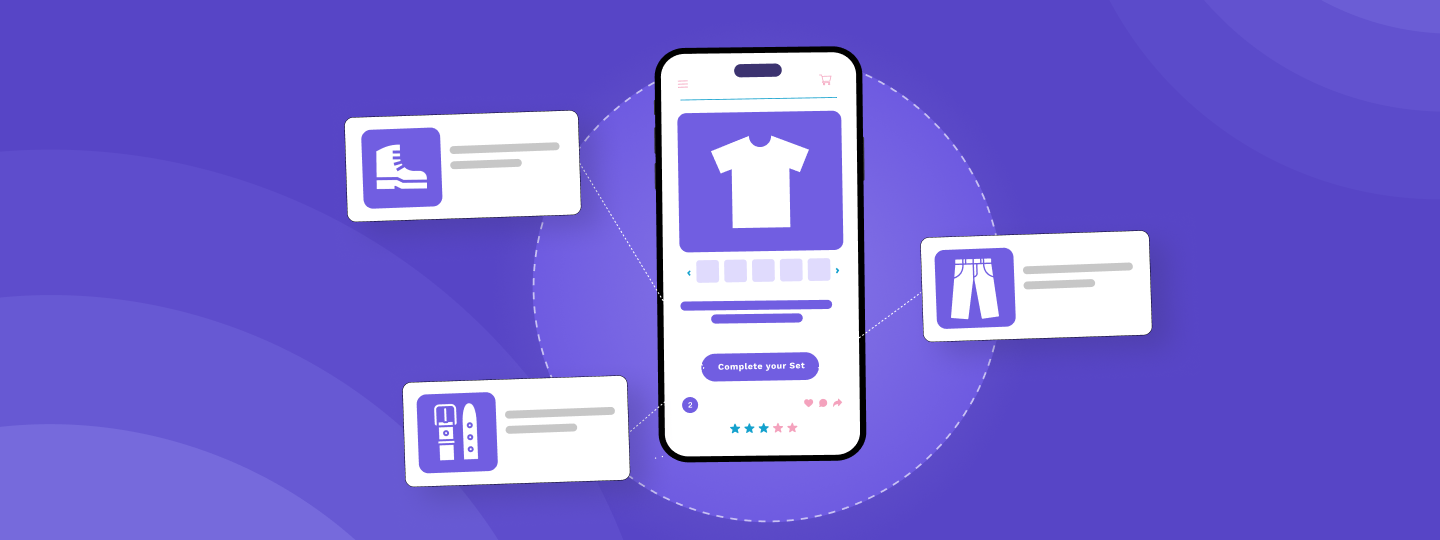
 Vanhishikha Bhargava
Vanhishikha Bhargava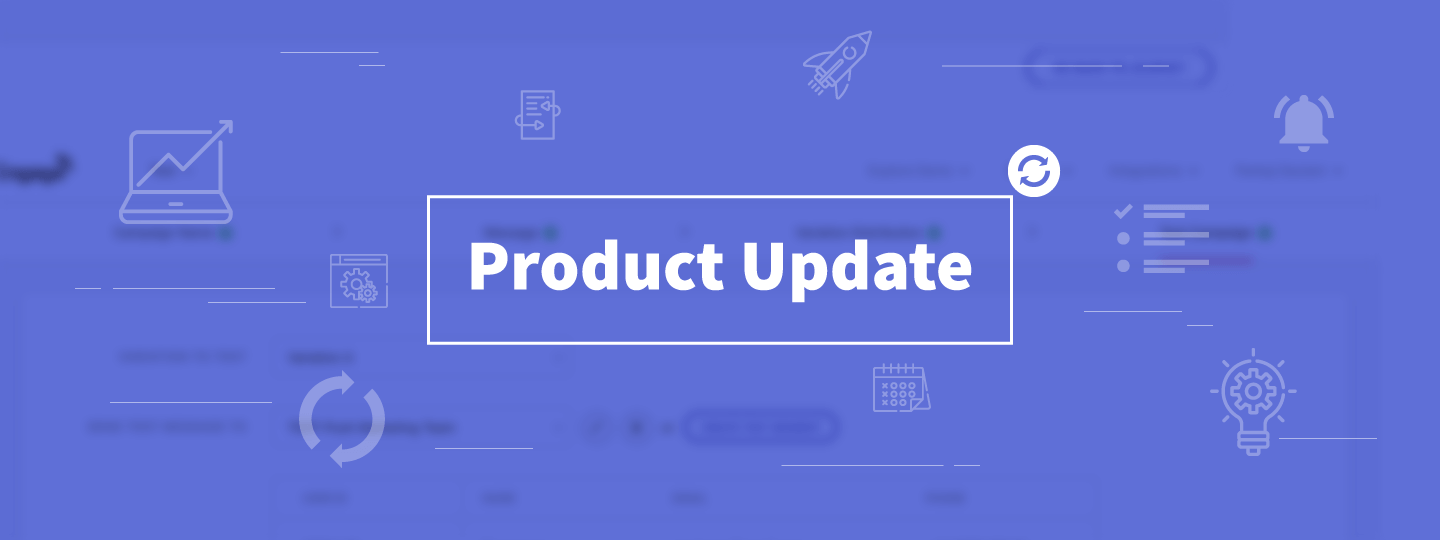
 Harshita Lal
Harshita Lal



